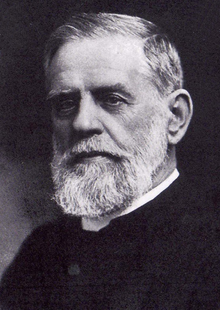William Campbell (missionary)
| The Rev. Dr William Campbell | |
|---|---|

Missionary and linguist
|
|
| Born | 1841 Scotland |
| Died | 9 September 1921 (aged 79–80) Scotland |
| Residence |
Scotland Qing Taiwan |
| Nationality | Scottish |
| Alma mater | University of Glasgow |
| Title | LL.D. |
| Signature | |
William Campbell (Chinese: 甘為霖; Pe̍h-ōe-jī: Kam Ûi-lîm) (1841–1921) was a Scottish Presbyterian missionary to Formosa (Qing Taiwan). He wrote extensively on topics related to Taiwan and was also responsible for founding the island's first school for the blind. Interested in the early history of the island (particularly the Dutch era), his knowledge of the time was such that he was called "without doubt the greatest authority on this subject living". He was probably the first European to see Sun-Moon Lake, which he named Lake Candidius in honour of the seventeenth century Dutch missionary George Candidius.
Campbell arrived in Qing-era Taiwan in 1871 to begin his mission in southern Taiwan, being stationed in Taiwan-fu, the capital of Taiwan Prefecture (modern-day Tainan) and serving both Han Chinese and Taiwanese aborigines in the area. He was a contemporary of Thomas Barclay, James Laidlaw Maxwell and George Leslie Mackay, who were all engaged in missionary work in Taiwan.
A strong supporter of "native ministers" (i.e. Han and aborigine clergy), Campbell wrote concerning one particular incident that
...our worthy Chinese colleague received a most hearty welcome from the brethren. He seemed to have great power in speaking to them at our forenoon service. [...] Whilst listening to him, one could not but feel the importance of having an educated native ministry in every part of China. Men like Pastor Iap are able to adapt themselves in a way the missionary can never do, and to overcome difficulties which must always hamper any mere sojourner in the country.
...
Wikipedia
